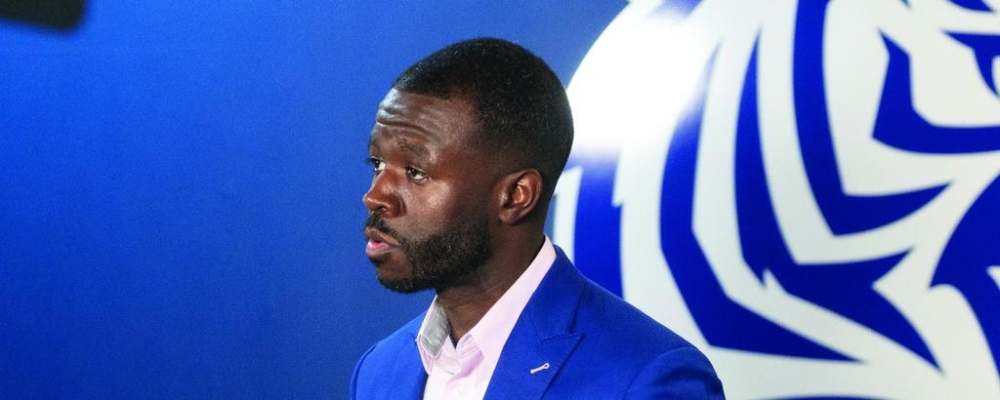Building Blocks

Duante’ Abercrombie’s grandfather, Jimmie, was as surprised as most outside Tennessee State University when his grandson became the first African-American Division I men’s ice hockey head coach.
“He couldn’t be prouder,” Abercrombie said. “He has lived in a world that is not the way it is now and for him to see something like this, his grandson leading the first HBCU hockey program ever, his reaction was—‘Is this really happening?’”
Thanks to the support of donors, the Historically Black College and University’s administration, the NHL, and the Nashville Predators, TSU is expected to begin Division I play this fall.
Abercrombie has been focused on laying the foundation for an independent program and garnering player commitments, which picked up this season, since being named head coach in April 2024. He said the commits are as excited as he is about the chance to build something from the ground up and “play their part in helping this great game grow in ways that will leave it better than where they found it.”
He learned how by heeding the examples of Neal Henderson and Graeme Townshend, two mentors who continue to encourage African-American boys and girls to enter the sport.
Abercrombie, a Washington, D.C area native, met Henderson after his mother, Devara, signed him up for a Learn to Skate program with the Fort Dupont Cannons, North America’s oldest minority-oriented youth program.
“I didn’t know anything about the Capitals or hockey,” Abercrombie said. “Mom just wanted me in something different from football and basketball. That was why I was doing the violin, gymnastics and swimming all before age 7.”
He was hooked.
While hockey’s speed and intensity proved attractive, it was the environment Henderson nurtured inside Fort Dupont Ice Arena that encouraged Abercrombie to play and later coach hockey.
“He is the reason that I’m able to live the life that I am, that I’m the coach I am, that I’m the man that I am,” Abercrombie said.
Henderson, the first Black man inducted into the U.S. Hockey Hall of Fame (2019), and Townshend were second dads for Abercrombie.
“Fort Dupont is arguably one of the worst neighborhoods in DC,” Abercrombie said. “It was very rough, and to see a person like Neal Henderson was so important. He asked how you were doing and he truly cared. Hockey was the way he spread his love to the people who needed it. There were some individuals who were way worse off than me, so for many he was that beacon.”
Townshend, the first Jamaican-born NHLer, now leads hockey schools.
“He is passionate and will do anything for anybody,” said Abercrombie, who turns 38 in mid-February. “When you see someone come from the same kind of place and accomplish what he did, you pay attention.”
Abercrombie then added, “(Henderson and Townshend) both showed me why vulnerability matters. I want people to remember that you can be very passionate and aggressive but not in a negative way. You can be a good person and succeed.”
He applied those lessons while picking up considerable coaching experience after his pro hockey playing career ended in 2016. Abercrombie worked for youth and high school programs in the D.C. area, and as an assistant at nearby NCAA Division III Stevenson University.
In 2021, he entered the then-Arizona Coyotes’ inaugural coaching internship program leading to a job as a coaching development associate with the Toronto Maple Leafs during the 2022-23 season. He served as a guest coach at the 2023-24 San Jose Sharks training camp.
Now, Abercrombie is looking to build a program at TSU that not only helps players have a great career on the ice, but also an even better life off the ice—lessons instilled upon him by his own mentors through the years. He said that TSU’s internship program with the Predators and the NFL’s Tennessee Titans are recruiting draws for players planning for life after hockey.
While recruits consider their future, Abercrombie is looking forward to when HBCUs playing hockey is commonplace.
“We may be the first, but we certainly won’t be the last,” Abercrombie said. “I want everybody in 10 years to look back and say, ‘You know what? Hockey at an HBCU makes all the sense in the world.’”
This story ran in the 2025 January/February Issue of USA Hockey Magazine.
Black History Month is observed in February and celebrates the rich cultural heritage, triumphs and adversities that are an indelible part of our country's history.
To learn more about Black History Month visit https://www.blackhistorymonth.gov
Source: usahockey.com
